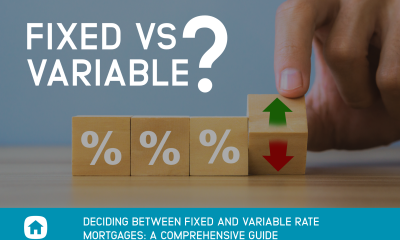
Photo by Rowan Heuvel
On Thursday, October 26, Canada’s central bank announced it is hiking its target overnight lending rate to 1.75% – a quarter of a percentage point bump. This increase is the third time the overnight rate has been raised in 2018.
The Bank of Canada’s decision is yet another step away from the era of ultra-low interest rates for Canadian homeowners. Since the overnight rate directly influences the prime rate that banks use to set interest rates for mortgages, lines of credit, and other loans, this increase will be passed on directly to the consumer, either instantly for those with variable rate mortgages, or in a delayed fashion for fixed-rate mortgage holders.
These sequential interest rates hikes are spelling trouble for fixed-rate mortgage holders, about 47% of whom have mortgages up for renewal in 2018. According to RateHub.ca’s historical mortgage rates, the lowest interest rate for a five-year fixed rate mortgage in Canada has jumped from of 2.21% in November 2016 to the current high of 3.19% – and that number is expected to continue to rise.
In the now-bygone era of ultra-low interest rates, the safe choice in the rising Canadian housing market has always been to lock in a five-year fixed rate mortgage. That mortgage term has always been the most popular for Canadians, but rising interest rates necessitate another look at variable rate mortgages. Here are two important reasons to consider a variable rate mortgage over a fixed rate mortgage if renewal is coming up on your calendar.
Less Expensive
Variable mortgages rates are always going to be lower than fixed mortgages rates, and that is because they inherently carry more risk. Right now, a five-year variable rate mortgage can be obtained for 2.31% interest. In contrast, the lowest five-year fixed rate mortgage runs for 3.25%. That’s a difference of 0.94%.
While a percentage point may not seem like much, it makes a big difference in monthly mortgage costs. If you purchased a home for the average price in Canada of $491,000 with a 20% down payment, and you chose a five year fixed rate mortgage, your monthly mortgage payment would be $1,650. If instead, you opted for a variable rate mortgage, your monthly payment would be $1,470. That’s a $2,160 difference per year!
It would take four consecutive Bank of Canada increases for variable mortgage rates to catch up with the current fixed mortgage rates. Since the Bank of Canada has increased their overnight rates four times in the past year, it is possible that variable rate mortgages would remain the best choice over fixed-rate mortgages in the near term. But we don’t know that is going to happen for sure, so your variable rate mortgage may continue to be less expensive than a fixed rate mortgage – or it may not.
Minimizing Penalties
The second compelling reason to consider a variable rate mortgage in this era of higher interest rates is to minimize the penalty you’ll pay if you break your mortgage term early. While the five-year fixed interest rate term is extremely popular in Canada, almost 60% of Canadian mortgage holders never make it to their renewal date.
Life happens, and events like divorce, job changes, or selling and moving to a new home will require you to break your mortgage term early. When this happens, you’ll incur a penalty.
If you have a variable rate mortgage, breaking your mortgage term requires you to pay a penalty of three months’ interest. If you have a fixed rate mortgage, you’ll have to pay either the greater of three months’ interest or the Interest Rate Differential (IRD). The IRD is usually based on the difference between your original mortgage interest rate and what the lender could charge today if it were to re-lend those funds for the remaining mortgage term.
Each lender calculates the IRD penalty differently, but the fees can add up. Penalties in the tens of thousands of dollars are not uncommon, depending on how far in your term you break your mortgage. If you think there is a chance that you’ll have to break your mortgage early, a variable rate mortgage offers a much more affordable and predictable penalty scheme.
Variable Rate Mortgages A Good Option Despite Risk
Variable rate mortgages may be a good way to save money, but in this rising interest rate environment, they do bear some risk. If you choose a variable rate mortgage right now, there is a good chance you’ll see your monthly mortgage payment rise at least once in the near future, which is why only 24 percent of Canadians chose a variable rate mortgage in 2016 – 2017, according to the Annual State of the Residential Mortgage Market in Canada report published by Mortgage Professionals Canada.
That said, if you are an experienced homeowner looking to minimize your housing costs in a rising interest rate environment, there is room to save money with a variable rate mortgage.

 Buying a Home5 years ago
Buying a Home5 years ago
 Credit6 years ago
Credit6 years ago
 Business4 years ago
Business4 years ago
 5 Mortgage Secrets7 years ago
5 Mortgage Secrets7 years ago
 Buying a Home6 years ago
Buying a Home6 years ago
 5 Mortgage Secrets6 years ago
5 Mortgage Secrets6 years ago
 News12 months ago
News12 months ago
 Business4 years ago
Business4 years ago






